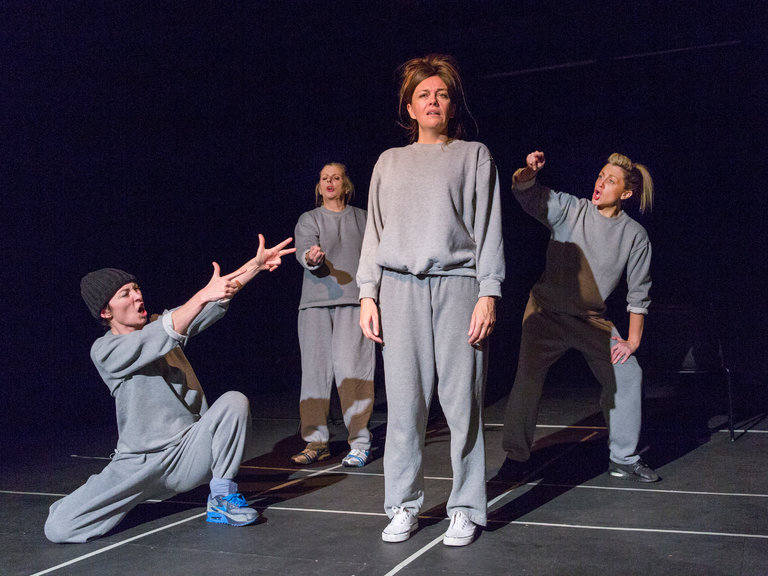Collaboration makes a bigger noise: women, theatre and criminal justice
This blog post sees Chair of the National Criminal Justice Arts Alliance (NCJAA), Alison Frater, reflect on an event that focused on women in the criminal justice system organised by NCJAA member Clean Break.
“On Monday 5th June, Clean Break and Queen Mary University of London co-hosted a unique and fascinating seminar exploring theatre for women and criminal justice in an international context with participants from Australia, South Africa and the UK. In a warm welcome, Dr Caoimhe McAvinchey talked about necessity and generosity, two words that went on to underpin the spirit of the day. Necessity because a conversation was much needed to discuss the distinctiveness of theatre practice that engages directly with women affected by criminal justice and the geo-socio-political factors that shape it. Generosity because everybody involved had given time freely to make sure that the conversation could happen.
For me the day was an inspiration. I have been thinking a lot about how we, the National Criminal Justice Arts Alliance, build capacity and advocacy for arts as a springboard for positive change. In spite of two years of political turmoil, we have gained support at the highest level with successive Ministers of Justice and the Department of Culture, Media and Sport recognising the transformational impact of art on people’s lives. Whether we should be doing this work is now not in doubt, but the question of ‘how’ and even ‘how best’ to deliver the benefits as widely as possible has remained unresolved. My epiphany – how to address this conundrum – came from the insights of participants working with these extraordinary theatre companies and the conversations we had throughout the day.
First was Catrina McHugh from Open Clasp Theatre Company, who talked passionately about the empathic response of women to the experiences told in her new play, Sugar, and in Key Change and Rattlesnake. This empathy was particularly evident when discussing the re-traumatising effect of incarceration on the lives of women who are already victims themselves. Minor crimes and short sentences tear families apart; women lose their children, their jobs, their homes. Poverty and discrimination are universally the predicting factors underpinning criminality, sentencing and incarceration for women, evidenced in presentations from Australia’s Somebody’s Daughter Theatre Company and Miranda Young-Jahangeer’s description of how social norms of patriarchy in South Africa institutionalise inequality.
Women are trapped to such an extent that rage is the – albeit unacceptable but – understandable response. There must be another way of compounding this level of injustice than merely incarcerating the victims of domestic violence.
A short play extract by Sonya Hale, Blis-ta Touch – commissioned by Clean Break, flavoured the discussion with a compelling, moving dialogue between two young people facing homelessness and living out the reality of exploitation, despite their dreams for a better future. Stories about injustice, including the unintended consequences of law and public policy, can be told through the arts in a way that gets people listening.
Rachel Conlon, Senior Lecturer at York St John’s Prison Partnership Project and students and staff from Clean Break Theatre Company then talked about how inspiring art created in criminal justice settings can be. It is often art that challenges, breaks new ground, and succeeds thanks to specialist organisations’ experience of building talents and skills for and with some of the most disregarded and powerless people in the world. These organisations have governance processes that comply with requirements for working in secure environments, they gather metrics to support monitoring and evaluation required by funders, and they know how to collaborate with organisations who can find support for people who might otherwise be excluded for need of a bus fare, for food, or a crèche. More importantly, they offer programmes that have cultural relevance, and they are sensitive to the needs of vulnerable people who may feel excluded from society because of a lack of formal education, unemployment, mental and physical health problems, or people who need support with addiction or homelessness.
These theatre companies replace the tensions that foster stigma and shame for people affected by the criminal justice system with one that recognises talent and provides opportunity for expression. In a transactional world relying on short term investment and competition for contracts for even the most precious of human support services, arts organisations stand up for values that promote trust and long term relationships. This is what makes the difference. One participant said “I am who I am now because of others.” Another added: “I’ve gone from being at risk of reoffending to becoming someone I am at peace with.”
Finally, discussion turned to ask why, when creativity is so powerful, is access to arts in criminal justice settings so unequal? There were frequent references to the importance of individuals; a person in an otherwise uninterested or preoccupied criminal justice system whose goodwill, generosity, insight and courage enabled creativity to take place.
My epiphany was that in putting together these conversations, we build a platform for change. We can give creative voice to marginalised and socially excluded people by developing specialist arts organisations who can reach into diverse communities and ensure an inclusive focus for the arts. But first we need to be more confident about the story we have to tell. Art can reveal truth because it embraces complexity and ambiguity. Second, we need to tell the story more widely, building on individual champions that sustain us to create a broader consensus that will change hearts and minds. As actor Jennifer Joseph says ‘collaborate – make more noise’.”






